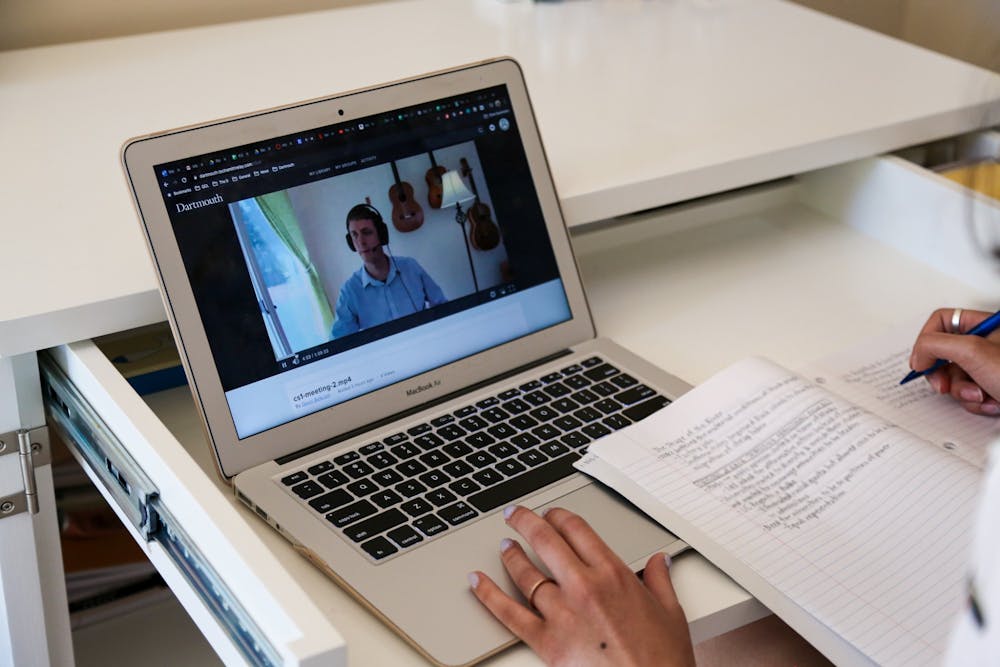
Professor Devin Balkcom holds a remote version of his computer science class.
To alleviate some of the challenges of remote learning, many professors have adapted their courses in an effort to keep their students engaged. In the process, some have found the online format an opportunity to implement new ideas — from extra TA support to class themes to visiting experts helping students with final projects.
Engineering professor Eugene Korsunskiy said that in ENGS 15.02, “Senior Design Challenge II,” his students vote via Zoom for the following day’s class “theme.” Past class themes have included “silly hat day,” “bring a stuffed animal to class day” and “bring a family member or friend to class day.”
Korsunskiy said that he hopes these themes “introduce little moments of delight and levity into the experience during a time when I think we can all use some more moments of delight and levity.”
Meanwhile, engineering professor Petra Bonfert-Taylor, who teaches ENGS 20, “Introduction to Scientific Computing,” said that she uses a Zoom background of a different room in the Thayer School of Engineering for each class in order to connect students with campus.
Additionally, various professors have attempted to increase engagement by inviting guest speakers who would usually be difficult to bring to campus. For example, public policy professor Charles Wheelan ’88 has brought a variety of guest speakers to his class, EDUC 20, “Education Issues in Contemporary Society,” including his wife Leah Wheelan ’88, the principal of Canaan Elementary School, Julia Bowen ’95, who founded a charter school in Massachusetts and Doug Phipps ’17, a former student of Wheelan’s who worked for Teach for America.
Similarly, environmental studies professor Melody Brown Burkins GR’95’98, who teaches ENVS 80.08, “The Practice of Science Policy & Diplomacy,” said that she designed her curriculum around the class’s weekly guest speakers, who have included College President Phil Hanlon and former president of Ireland and a patron for the International Science Council Mary Robinson.
Will Glovsky ’23 said that for him, guest speakers are the “number one [most effective] strategy” to foster class engagement. He said, however, that there’s “a limit to how engaging you can make a [virtual] class.”
“While I appreciate the effort [my professors are making] … if [the class] is not going to engage me, I don’t think it is worth my money,” Glovsky said, adding that if the fall term were to go online, he would continue his summer remote internship rather than take classes.
Burkins said that she finds it easier to bring in speakers during the remote term than during an on-campus term because she does not need to arrange travel and can bring speakers to class with less advance warning. She added that this term, she she hopes to continue bringing experts into final project groups during future terms via Zoom.
Computer science professor Lorie Loeb said that in her COSC 22, “3D Digital Modeling” class, she has brought professional designers to engage with her students by meeting with project groups and giving them advice on their final projects.
Loeb added that she has spent more time with individual students in order to encourage more students to participate in class and in office hours. For COSC 22 and COSC 25.01 “Intro to UI/UX Design,” Loeb said that she holds mandatory 15-minute calls with each of her students.
Multiple faculty members emphasized the contributions of learning fellows and teaching assistants in coming up with engagement strategies and supporting students.
Bonfert-Taylor said that TAs tend to have more time to dedicate due to the remote term, so students have "more equitable access to the TA support than what we normally can provide.”
In Loeb’s COSC 25.01 class, each student is assigned to a TA called a “Yoda,” whose job is to “watch and help wherever needed … [and] make sure the student is doing OK.”
Similarly, Korsunskiy said that in his ENGS 12, “Design Thinking” class, the TAs have spearheaded the creation of “TA families” — small groups of students assigned to specific TAs. Students are encouraged to reach out to the TA on Slack for help, he said.
Professors have also turned to new resources to promote collaboration and engagement. In Wheelan’s EDUC 20 class, for example, he uses online video quizzes, in which students respond on the spot to a pre-recorded question. Wheelan said that he plans to continue using video quizzes in future, on-campus terms.
In addition to the current platforms, vice president of information, technology and consulting Mitchel Davis said he and ITC encourage students to share their experience with online classes, adding that he hopes to continue to improve and expand online resources and platforms in future terms. For example, Davis said that he hopes Dartmouth can offer an augmented or virtual reality environment by sending virtual reality goggles to students in future terms.
"try" - Google News
May 04, 2020 at 01:05PM
https://ift.tt/2zXFImv
Professors try new techniques to engage students online - The Dartmouth
"try" - Google News
https://ift.tt/3b52l6K
Shoes Man Tutorial
Pos News Update
Meme Update
Korean Entertainment News
Japan News Update
Bagikan Berita Ini














0 Response to "Professors try new techniques to engage students online - The Dartmouth"
Post a Comment